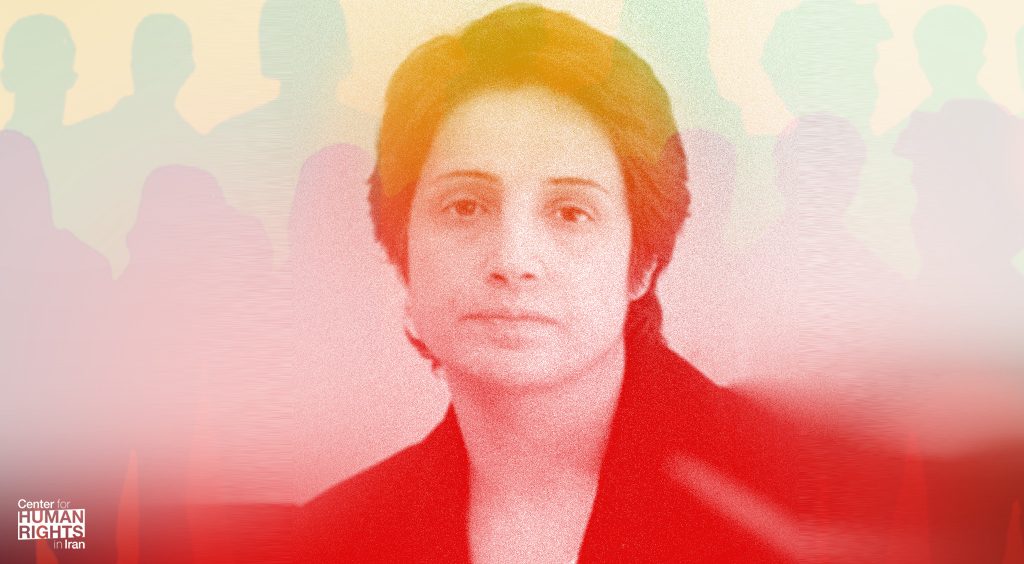Nasrin Sotoudeh Begins Hunger Strike in Evin Prison

Prominent Attorney Seeks Release of Political Prisoners Amid COVID-19 Outbreak
August 12, 2020—The imprisoned human rights lawyer Nasrin Sotoudeh began a hunger strike on August 11, 2020, to demand the release of political prisoners threatened by the COVID-19 virus, which has spread in Tehran’s Evin Prison.
“With COVID-19 spreading through Iran’s overcrowded, unhygienic prisons, the unjust sentences of political prisoners could turn into death sentences unless these men and women are immediately released for medical care,” said Hadi Ghaemi, executive director of the Center for Human Rights in Iran (CHRI).
Sotoudeh’s hunger strike follows a lack of response from the judicial authorities to several letters she had written about poor conditions surrounding political prisoners, Sotoudeh’s husband, Reza Khandan, told CHRI on August 11, 2020.
Prisoners Falling Ill Amid Lack of Proper Medical Care and Testing
Twelve political prisoners and prisoners of conscience have recently tested positive for COVID-19 at Evin Prison’s Ward 8. Only one has been hospitalized and the rest, despite several prisoners having serious underlying health conditions, have not received proper medical care.
Moreover, only 17 prisoners were recently tested, while many more than this have reportedly displayed symptoms. As there is no separation of the prisoners displaying symptoms, there is grave concern that a large number of prisoners may have contracted the virus.
Sotoudeh’s Letter from Prison
CHRI has obtained a copy of a letter written by Sotoudeh from Evin Prison’s Women’s Ward addressed to human rights activists, in which she explains the reasons for her action:
“In the midst of the coronavirus crisis engulfing Iran and the world, the situation facing political prisoners has become so difficult that their continued incarceration under these tyrannical conditions has become impossible.
“Political [activists] have been accused of unbelievable acts: espionage, corruption on earth, undermining national security, prostitution, forming illegal channels on Telegram [the messaging app] which can keep them behind bars for up to 10 years or even lead to execution.
“From the very start of the judicial process all the way through to sentencing, many suspects are denied independent legal representation or prevented from unrestrained consultation with their lawyers.
“Revolutionary Court judges have repeatedly and unabashedly told political prisoners that verdicts are issued only on the basis of reports prepared by intelligence and security agencies and interrogators spell out in advance the sentences awaiting suspects.
“Lawyers who challenge Revolutionary Court judges are sent to prison. Political suspects, charged with serious, unimaginable acts, are given maximum punishments – in some cases more severe than in the law – and then they wait, hoping for a legal solution under these unjust conditions.
“[The law] promises defendants an appellate process during which they are conditionally released, punishment is suspended and verdicts are not enforced until the Appeals Court makes a ruling, while punishments are supposed to be kept to a minimum in accordance to a new law. Instead the authorities resort to unlawful methods and bow to the opinions of interrogators, thus blocking the last [legal] avenues on political prisoners.
“Many prisoners are currently eligible for conditional release and many of them will be freed with the enforcement of a new law. [Editor’s note: In February 2020, due to the coronavirus threat, those who had been sentenced up to five years in prison and served a third of their term were pardoned.] However, prisoners are being treated as if there is no such law or legal recourse, while the authorities refuse to respond to any communications requesting legal steps [for prisoners’ release].
“Given the lack of any response to communications and requests for the freedom of political prisoners, I am starting a hunger strike.
“With the hope that one day justice may prevail in my homeland; the land of Iran.
“Evin [Prison], Nasrin Sotoudeh”
Nasrin Sotoudeh is currently behind bars at Evin Prison, sentenced to 38 years in prison for her peaceful work as a human rights attorney, 12 years of which she must serve before becoming eligible for parole. Among her charges were “encouraging prostitution” for advocating against compulsory hijab and defending citizens’ right to peaceful dissent.
UN, Human Rights Groups Call for Release of Political Prisoners
Iran’s political prisoners were largely left out of the country’s March 2020 mass release of prisoners, which was aimed at stemming the mounting deaths from COVID-19 in the country. UN experts have expressed great concern for Iran’s prisoners and have called for the release of all arbitrarily detained prisoners “before it is too late.”
CHRI calls on the authorities in Iran to immediately release all political prisoners and to ensure that care for all remaining prisoners conforms to international standards, which should include the release all prisoners testing positive for COVID-19, all those displaying any symptoms, and all those who have come into contact with any ill individuals, for immediate medical care.
Read a version of this article in Persian.






